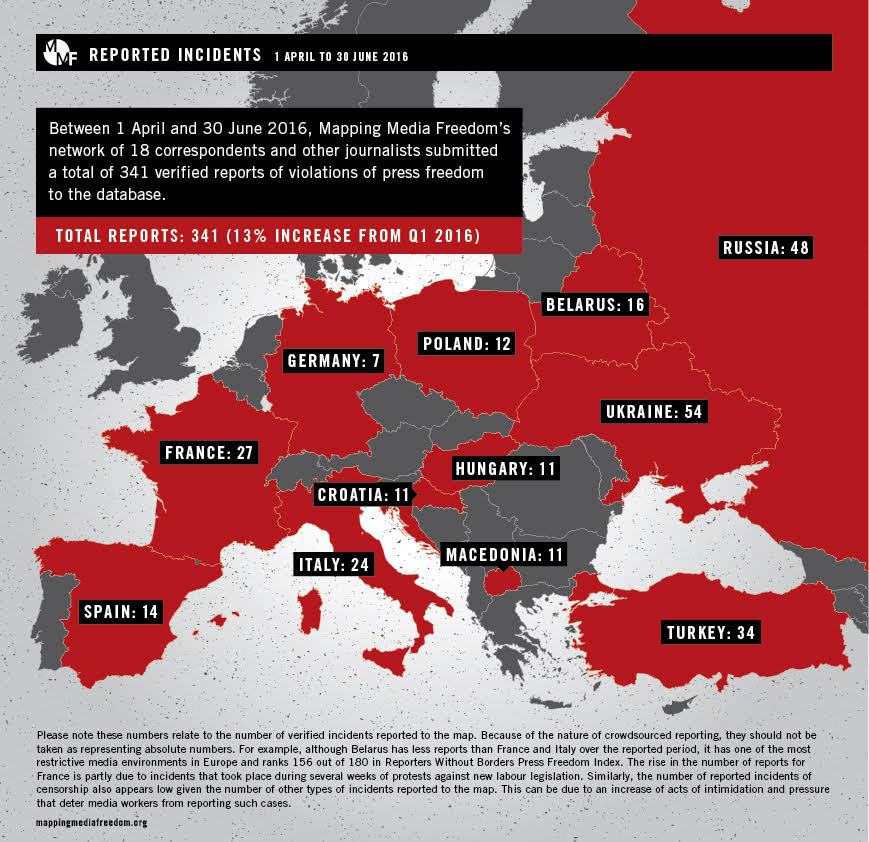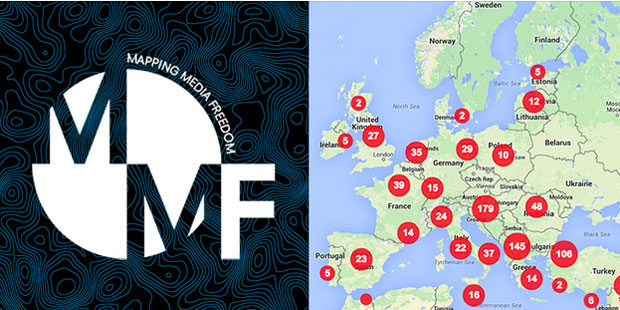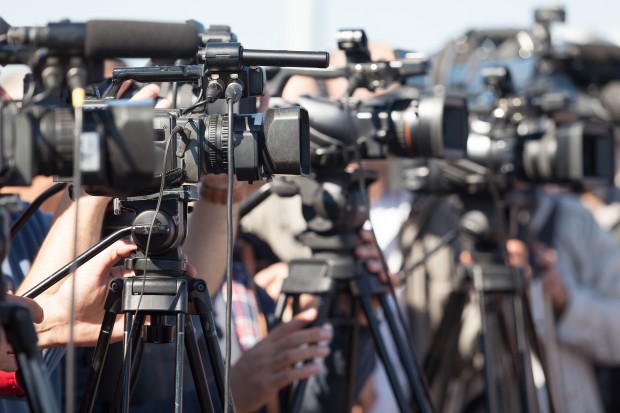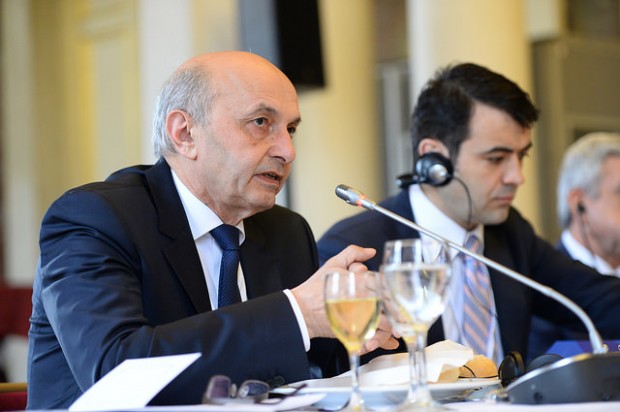2 Aug 2016 | About Index, Index Reports, Press Releases

Violence against journalists in Europe increased in the second quarter of 2016, reports submitted to Index on Censorship’s Mapping Media Freedom platform show, as a government crackdown in Turkey intensified and protests turned violent in countries from France to Finland.
“Europe is considered one of the safest places for journalists in the world. However, increasing concerns about national security in the region – coupled with creeping authoritarianism – is making it an increasingly difficult place for the media to operate freely and safely,” said Hannah Machlin, project officer for Mapping Media Freedom. “And the threats are not just coming from the usual suspects: 12 incidents of injuries to journalists occurred in France and in a number of these cases journalists appear to have been directly targeted by police.”
Between 1 April and 30 June 2016, Mapping Media Freedom’s network of 18 correspondents and other journalists submitted a total of 341 violations of press freedom to the database, a 13% rise over the first quarter of 2016.
Key findings from the Q2 report
- Two journalists were killed. Mohammed Zahir al-Shergat died as a result of gunshot wounds in the city of Gaziantep, Turkey; journalist and radio host Luka Popov from northern Serbia was found dead in his home in Srpski Krstur
- 60 incidents of physical assault were confirmed
- 45 criminal charges and civil lawsuits were filed
- Media professionals were detained in 41 incidents
- 80 verified reports of intimidation, which includes psychological abuse, sexual harassment, trolling/cyberbullying and defamation were recorded
- Work was censored or altered 15 times
- Media professionals were blocked from covering a story in 73 incidents
“The fight for the abolition of prison sentences for offences committed through the press is unfortunately still relevant in Europe and neighboring countries,” Christophe Deloire, Reporters Without Borders secretary general said. “In a climate of growing fear and suspicion, judicial persecution of journalists takes more and more diversified forms. The Turkish authorities continue to invoke the anti-terrorism law, the protection of state secrets or insults to the head of state to prosecute and imprison more journalists.”
“Journalists are beaten, intimidated, imprisoned and killed in the pursuit of telling a story, exposing the truth and informing the public. These courageous men and women are the vanguard for free speech, freedom of expression and, ultimately, a free and democratic society. We need to come together and fight for journalists’ safety and end impunity for crimes committed against journalists,” said Dunja Mijatović, the OSCE Representative on Freedom of the Media.
The report is available now at https://mappingmediafreedom.org/plus/ or as a PDF.
For more information, please contact Hannah Machlin, Mapping Media Freedom project officer at [email protected]
About Mapping Media Freedom
Mapping Media Freedom – a joint undertaking with the European Federation of Journalists and Reporters Without Borders and partially funded by the European Commission – covers 42 countries with a network of correspondents, including all EU member states, plus Albania, Azerbaijan, Belarus, Bosnia, Iceland, Kosovo, Macedonia, Montenegro, Norway, Russia, Serbia, Turkey, Ukraine and Vatican City. In September 2015 the platform expanded to monitor Russia, Ukraine and Belarus and in February 2016 into Azerbaijan. Each report is fact checked with local sources before becoming available on the interactive map. Since launching in May 2014, the map has recorded over 2,000 incidents threatening media freedom.
24 May 2016 | About Index, Azerbaijan News, Campaigns, Campaigns -- Featured, Europe and Central Asia, Mapping Media Freedom, mobile

Journalists have been murdered and burned in effigy. Reporters have been publicly discredited by government officials, prosecuted for under anti-terrorism laws and excluded from public meetings on the refugee crisis. We’ve even recorded journalists being menaced with mechanical diggers.
Mapping Media Freedom launched to the public on 24 May 2014 to monitor media censorship and press freedom violations throughout Europe. Two years on, the platform has verified over 1,800 incidents, ranging from insults and cyberbullying to physical assaults and assassination.
“The original impetus behind the project was to uncover everyday attacks on press freedom in Europe. The database has given Index, its partners and policy makers a highly unnerving look at the ways journalists are barred, attacked or even murdered simply for doing their jobs,” Hannah Machlin, project officer for Mapping Media Freedom, said.
The project has been granted renewed funding by the European Commission.
“The strength of Mapping Media Freedom is that it provides an ongoing narrative about the state of press freedom in the European region. It is gratifying that the European Commission values its contribution to the project by renewing its funding for a third year,” Melody Patry, senior advocacy officer, Index on Censorship said.
Over the period of coverage, Mapping Media Freedom has released periodic reports on the verified incidents. In the first quarter of 2016, the project received a total of 301 violations of press freedom to the database, a 30% rise over the fourth quarter of 2015. Earlier reports documented similar trends: February 2016, October 2015, May 2015 and December 2014.
The platform — a joint undertaking with the European Federation of Journalists and Reporters Without Borders and partially funded by the European Commission — covers 40 countries, including all EU member states, plus Albania, Belarus, Bosnia, Iceland, Kosovo, Macedonia, Montenegro, Norway, Russia, Serbia, Turkey, Ukraine and Azerbaijan. In September 2015 the platform expanded to monitor Russia, Ukraine and Belarus and in February 2016 into Azerbaijan. Since launching in May 2014, the map has recorded over 1,800 violations of media freedom, as 17 May 2016. Each report is fact checked with local sources before becoming publicly available on the interactive map.
Mapping Media Freedom works in conjunction with the Council of Europe’s platform about the safety and protection of journalists, provides resources for researchers and information for journalists. It is also affiliated with European Youth Press, Media Legal Defence Initiative, Human Rights House Kiev, Ossigeno per L’Informazione, Osservatorio Balconi e Caucaso and the European Centre for Press and Media Freedom.
24 Mar 2016 | Magazine, mobile, Volume 45.01 Spring 2016
[vc_row][vc_column][vc_custom_heading text=”This year brings the 400th anniversary of William Shakespeare’s death and Index on Censorship is marking it with a special issue of our award-winning magazine, looking at how his plays have been used around the world to sneak past censors or take on the authorities – often without them realising.”][vc_row_inner][vc_column_inner width=”1/2″][vc_column_text]
Our special report explores how different countries use different plays to tackle difficult themes. Hungarian author György Spiró writes about how Richard III was used to taunt eastern European dictators during the 1980s. Dame Janet Suzman remembers how staging Othello with a black lead during apartheid in South Africa caused people to walk out of the theatre.
[/vc_column_text][/vc_column_inner][vc_column_inner width=”1/2″][vc_single_image image=”74261″ img_size=”full”][/vc_column_inner][/vc_row_inner][vc_column_text]
Kaya Genç tells of a 1981 production of A Midsummer’s Night Dream in Turkey that landed most of the cast in jail. And Brazilian director Roberto Alvim recounts his recent staging of Julius Caesar, which was inspired by the country’s current political tumult. The issue also includes contributions from Simon Callow, Tom Holland, Preti Taneja and Kathleen E McLuskie. Plus we explore Shakespeare’s ability to provoke and protest in India, Zimbabwe and the USA. Currently Shakespeare is very much in favour in China and our contributing editor Jemimah Steinfeld explores why.
Shakespeare aside, we have Hollywood screenwriter John McNamara on why his film on blacklisted screenwriter Dalton Trumbo nearly didn’t make it to the big screen. There are interviews with US academic Steven Salaita and Syrian playwright Liwaa Yazji. We look at how one man from New Zealand has been hacking North Korea for years. And we explore Index’s archives on Argentina’s dictatorship, 40 years after the coup, with interviews from former prisoners and descendants of the disappeared.
The issue also includes new fiction from Akram Aylisli, one of Azerbaijan’s leading, and persecuted, writers. Plus lyrics from Egyptian musician Ramy Essam, famed for his performances in the Tahrir Square revolution, and Basque protest singer Fermin Muguruza. And there are illustrations and cartoons by Martin Rowson, Ben Jennings, Eva Bee and Brian John Spencer.
Order your copy here, or take out a digital subscription via Exact Editions (just £18 for the year, with a free trial). Copies are also available in excellent bookshops including at the BFI and Serpentine Gallery (London), News from Nowhere (Liverpool), Home (Manchester) and on Amazon. Each magazine sale helps Index on Censorship fight for free expression worldwide.
[/vc_column_text][/vc_column][/vc_row][vc_row][vc_column][vc_custom_heading text=”SPECIAL REPORT: STAGING SHAKESPEREAN DISSENT” css=”.vc_custom_1483446641352{margin-right: 0px !important;margin-left: 0px !important;border-bottom-width: 1px !important;padding-top: 15px !important;padding-bottom: 15px !important;border-bottom-color: #455560 !important;border-bottom-style: solid !important;}”][vc_column_text]
Plays that protest, provoke and slip by the censors
Rising star – Jemimah Steinfeld on how China has embraced Shakespeare, with performances spanning from brash pro-government productions to a Tibetan Hamlet
When the show doesn’t go on – Jan Fox reports on why school and community theatre productions in the US are under increasing pressure to curb “controversial” themes
The Bard meets Bollywood – Suhrith Pathasarathy looks at how India’s films use Shakespeare to tackle controversy
Lifting the curtain on Zimbabwe – While Shakespeare’s tales of power play and ageing rulers get the go-ahead, local playwrights struggle to be heard, says playwright Elizabeth Zaza Muchemwa
Lend me your ears – Claire Rigby interviews leading Brazilian director Roberto Alvim about tackling his country’s current political turmoil through Julius Caesar
The play’s the thing – Kathleen E McLuskie on how the Bard kept out of trouble with the censors of his day, despite some close calls
Morals made to measure – Tom Holland suggests that Measure for Measure could be reworked for our times
Stripsearch – Martin Rowson’s cartoon on how the history plays would be staged in the Pious People’s Hereditary Democractic Republic of Kryxygistan
The writer of our discontent – György Spiró remembers when a Hungarian staging of Richard III became a way to take on eastern Europe’s dictators
Star-crossed actors – Preti Taneja visits a dual production of Romeo and Juliet staged by theatres in Kosovo and Serbia
When the Dream upset the regime – Kaya Genç on the enduring legacy of a subversive 1981 performance of A Midsummer Night’s Dream in Turkey
Say no moor – Dame Janet Suzman tells Natasha Joseph why South Africa’s apartheid-era censors wouldn’t dare touch Othello
[/vc_column_text][/vc_column][/vc_row][vc_row][vc_column][vc_custom_heading text=”IN FOCUS” css=”.vc_custom_1481731813613{margin-right: 0px !important;margin-left: 0px !important;border-bottom-width: 1px !important;padding-top: 15px !important;padding-bottom: 15px !important;border-bottom-color: #455560 !important;border-bottom-style: solid !important;}”][vc_column_text]
Theatre of war – Charlotte Bailey interviews Syrian playwright Liwaa Yazji
Beyond belief – Ryan McChrystal looks at whether Ireland’s new government will finally phase out the country’s blasphemy law
Exposing history’s faultlines – Vicky Baker explores the Index archives for stories of Argentina’s dictatorship 40 years on, and talks to those who were affected
Rainbow warriors – Duncan Tucker reports on the attacks and killings of LGBT activists in Honduras
Hack job – Sybil Jones interviews Frank Feinstein, who monitors the North Korean propaganda machine
“They worried I’m dangerous. I’m absolutely harmless” – Nan Levinson speaks to US academic Steven Salaita who lost his job after posting controversial tweets
Tools and tricks for truthseekers – Alastair Reid and Peter Sands on why people need to learn verification techniques to combat hoaxes and misinformation on social media
Your television is watching you – Jason DaPonte explains how information stored by internet-connected home devices could be used against us
Tackling Trumbo – Hollywood screenwriter John McNamara on how his story about blacklisted writer Dalton Trumbo almost didn’t make it to screens
[/vc_column_text][/vc_column][/vc_row][vc_row][vc_column][vc_custom_heading text=”CULTURE” css=”.vc_custom_1481731777861{margin-right: 0px !important;margin-left: 0px !important;border-bottom-width: 1px !important;padding-top: 15px !important;padding-bottom: 15px !important;border-bottom-color: #455560 !important;border-bottom-style: solid !important;}”][vc_column_text]
Know your enemy – John Angliss introduces his translation of a new short story by one of Azerbaijan’s leading, persecuted writers, Akram Aylisli
Borderless bard – Josie Timms interviews poet Edin Suljic who fled war in Yugoslavia and found inspiration in Shakespeare
Singing for Tahrir – Musician Ramy Essam who roused crowds during the Egyptian revolution shares his lyrics and future plans
Notes of discord – Rachael Jolley speaks to the Basque singer Fermin Muguruza about having his concerts banned in Madrid
[/vc_column_text][/vc_column][/vc_row][vc_row][vc_column][vc_custom_heading text=”COLUMNS” css=”.vc_custom_1481732124093{margin-right: 0px !important;margin-left: 0px !important;border-bottom-width: 1px !important;padding-top: 15px !important;padding-bottom: 15px !important;border-bottom-color: #455560 !important;border-bottom-style: solid !important;}”][vc_column_text]
Global view – Index on Censorship CEO Jodie Ginsberg debunks the argument that powerful voices should be silenced to promote the free speech of others
Index around the world – Josie Timms runs through the latest news on Index on Censorship’s global work, including a Magna Carta-inspired youth project
[/vc_column_text][/vc_column][/vc_row][vc_row][vc_column][vc_custom_heading text=”END NOTE” css=”.vc_custom_1481880278935{margin-right: 0px !important;margin-left: 0px !important;border-bottom-width: 1px !important;padding-top: 15px !important;padding-bottom: 15px !important;border-bottom-color: #455560 !important;border-bottom-style: solid !important;}”][vc_column_text]
T-shirted turmoil – Vicky Baker looks at the power of the slogan T-shirt and how one can land you in trouble with the law
[/vc_column_text][/vc_column][/vc_row][vc_row][vc_column][vc_custom_heading text=”SUBSCRIBE” css=”.vc_custom_1481736449684{margin-right: 0px !important;margin-left: 0px !important;border-bottom-width: 1px !important;padding-bottom: 15px !important;border-bottom-color: #455560 !important;border-bottom-style: solid !important;}”][vc_column_text]Index on Censorship magazine was started in 1972 and remains the only global magazine dedicated to free expression. Past contributors include Samuel Beckett, Gabriel García Marquéz, Nadine Gordimer, Arthur Miller, Salman Rushdie, Margaret Atwood, and many more.[/vc_column_text][vc_row_inner][vc_column_inner width=”1/2″][vc_single_image image=”76572″ img_size=”full”][/vc_column_inner][vc_column_inner width=”1/2″][vc_column_text]In print or online. Order a print edition here or take out a digital subscription via Exact Editions.
Copies are also available at the BFI, the Serpentine Gallery, MagCulture, (London), News from Nowhere (Liverpool), Home (Manchester), Calton Books (Glasgow) and on Amazon. Each magazine sale helps Index on Censorship continue its fight for free expression worldwide.
 SUBSCRIBE NOW[/vc_column_text][/vc_column_inner][/vc_row_inner][/vc_column][/vc_row]
SUBSCRIBE NOW[/vc_column_text][/vc_column_inner][/vc_row_inner][/vc_column][/vc_row]
24 Mar 2016 | About Index, Europe and Central Asia, Mapping Media Freedom, News and features

Each week, Index on Censorship’s Mapping Media Freedom project verifies threats, violations and limitations faced by the media throughout the European Union and neighbouring countries. Here are just five reports from 15-22 March that give us cause for concern.
Serbia: B92 journalists receive several death threats
Several death threats have been sent to journalists at the investigative journalism portal insajder.net which is owned by broadcaster B92. The threats were sent via email to several reporters between 14 and 22 March.
Insajder’s editor-in-chief Brankica Stankovic and B92’s editor-in-chief Veran Matic have also received threats. Both have been under police protection for years due to severe threats.
Interior Minister Nebojsa Stefanovic announced on 23 March that a person had been arrested for threatening Stankovic and Matic. Due to a pending police investigation no details of the threats have been revealed, Veran Matic told Index on Censorship.
Kosovo: Investigative journalist claims prime minister threatened him

Isa Mustafa, European People’s Party Summit, March 2015, Brussels. Credit: Flickr / EPP
Vehbi Kajtaz, a journalist for the investigative reporting portal insajderi.com claims he received a threatening phone call from Kosovo’s prime minister, Isa Mustafa, on 20 March.
Kajtazi had published an in which he criticised Kosovo’s healthcare system, stating it is so poor that even Mustafa’s brother has to seek asylum in the EU for treatment for his throat cancer. Mustafa has denied threatening the journalist.
On 21 March, Kajtaz wrote on his Facebook page that Mustafa had called him on his mobile phone on the day previous. Kajtazi claims that Mustafa was angry about an article mentioning his brother and said that the journalist would “pay heavily”.
Serbia: Investigative portal claims to be monitored by pro-government tabloid
The Serbian Crime and Corruption Reporting Network (KRIK) has condemned the “lynch campaign” against it by Informer, a Serbian pro-government tabloid. KRIK claims Informer has been following its editor-in-chief Stevan Dojcinovic, monitoring its work and putting his life at risk.
On 18 March, Informer published a photo of Dojcinovic on the front page with an article stating that KRIK is working with “drug dealers, criminals, corrupt cops, but also agents of some of the foreign intelligence services” in order to force prime minister Aleksandar Vucic to give up his position.
“Besides the fact that KRIK’s editor was followed and photographed on the street, we are most concerned about the details presented in the article about specifics of our current journalistic research on the assets of politicians,” Jelena Vasic from KRIK told Index on Censorship. “This raises a serious question about who is monitoring KRIK and how they know the details of our unpublished stories.”
Russia: Local editor and deputy knifed by two assailants
Two unidentified individuals attacked Igor Rudnikov, the founder and editor of the newspaper Novaye kolyosa and deputy of the Kaliningrad district parliament, on 17 March. The attack took place at a café in the city centre where Rudnikov often frequents.
The assailants reportedly waited for him outside the café and when the editor left, they slashed him with a knife. Rudnikov was taken to hospital where he was operated on. The editor’s contacts claim the attack is related to his journalism activities.
He has published a number of articles on crime and corruption in the Kaliningrad region. He was previously assaulted in 1998 when he was Rudnikov was severely beaten in the entrance to his home.
Macedonia: Constitutional court ban journalists from session
The constitutional court in Macedonia announced on 16 March that a session on whether the president will regain the right to pardon persons convicted of electoral fraud would be closed to journalists and the public.
A heavy police presence kept protesters and critics 100 metres away from the court building, while a group of government supporters had set up camp protesting “in defence of the judges”. In a statement, the Association of Journalists in Macedoni (ZNM) and condemned the decision to hold such an important session behind closed doors and have.
Until 2009, the president had right to pardon people accused of convicted of electoral fraud. The court has now ruled that the president can pardon alleged election-riggers.




